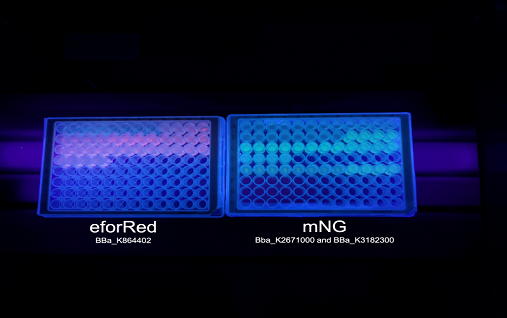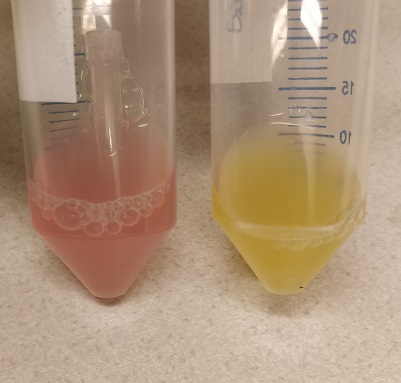Difference between revisions of "Part:BBa K864402:Experience"
| Line 10: | Line 10: | ||
2019 iGEM team Linkoping Sweden validated this part.<br><br> | 2019 iGEM team Linkoping Sweden validated this part.<br><br> | ||
| − | [[File:T--Linkoping_Sweden--eforrudtsgfytdpl.jpeg| | + | [[File:T--Linkoping_Sweden--eforrudtsgfytdpl.jpeg|200px|thumb|left|<b>Figure 1.</b> This biobrick after 48 hours in 37 degrees Celsius. Bacterial host in the picture is E. coli BL21 DE3 Gold. The picture is with the plate in 302 nm UV light, which also shows eforReds fluorescence.]] |
| − | [[File:T--Linkoping Sweden--pcons-eforred.jpeg| | + | [[File:T--Linkoping Sweden--pcons-eforred.jpeg|200px|thumb|center|<b>Figure 1.</b> This biobrick after 48 hours in 37 degrees Celsius. Bacterial host in the picture is E. coli BL21 DE3 Gold. This biobrick is to the left and a control (wild-type BL21) is to the right. The cultured tubes had a constant access to oxygen.]] |
<br><br><br> | <br><br><br> | ||
| − | [[File:T--Linkoping_Sweden--eforredvsmngphoto.jpeg| | + | [[File:T--Linkoping_Sweden--eforredvsmngphoto.jpeg|200px|thumb|right|<b>Figure 1.</b> The biobrick in a 96-well plate (left), the culture has been in the well O.N in 37 degrees Celsius with a constant access to oxygen. The plate to the right is different expression systems used to test a green fluorescent protein. These results show eforReds ability to fluorescence, making it a fluorescent as well as a chromoprotein.]] |
<br><br><br><br><br><br><br><br> <br><br><br><br><br><br><br><br><br><br><br><br><br><br><br><br><br><br> | <br><br><br><br><br><br><br><br> <br><br><br><br><br><br><br><br><br><br><br><br><br><br><br><br><br><br> | ||
Revision as of 02:59, 15 August 2019
This experience page is provided so that any user may enter their experience using this part.
Please enter
how you used this part and how it worked out.
Applications of BBa_K864402
2019 iGEM team Linkoping Sweden
2019 iGEM team Linkoping Sweden validated this part.

Figure 1. The biobrick in a 96-well plate (left), the culture has been in the well O.N in 37 degrees Celsius with a constant access to oxygen. The plate to the right is different expression systems used to test a green fluorescent protein. These results show eforReds ability to fluorescence, making it a fluorescent as well as a chromoprotein.
User Reviews
UNIQ326249422e259248-partinfo-00000000-QINU UNIQ326249422e259248-partinfo-00000001-QINU


